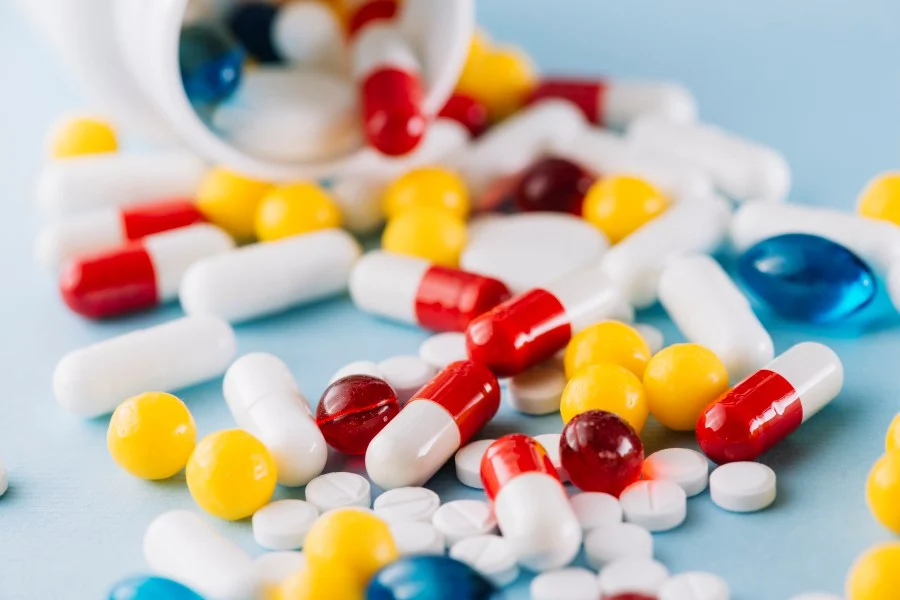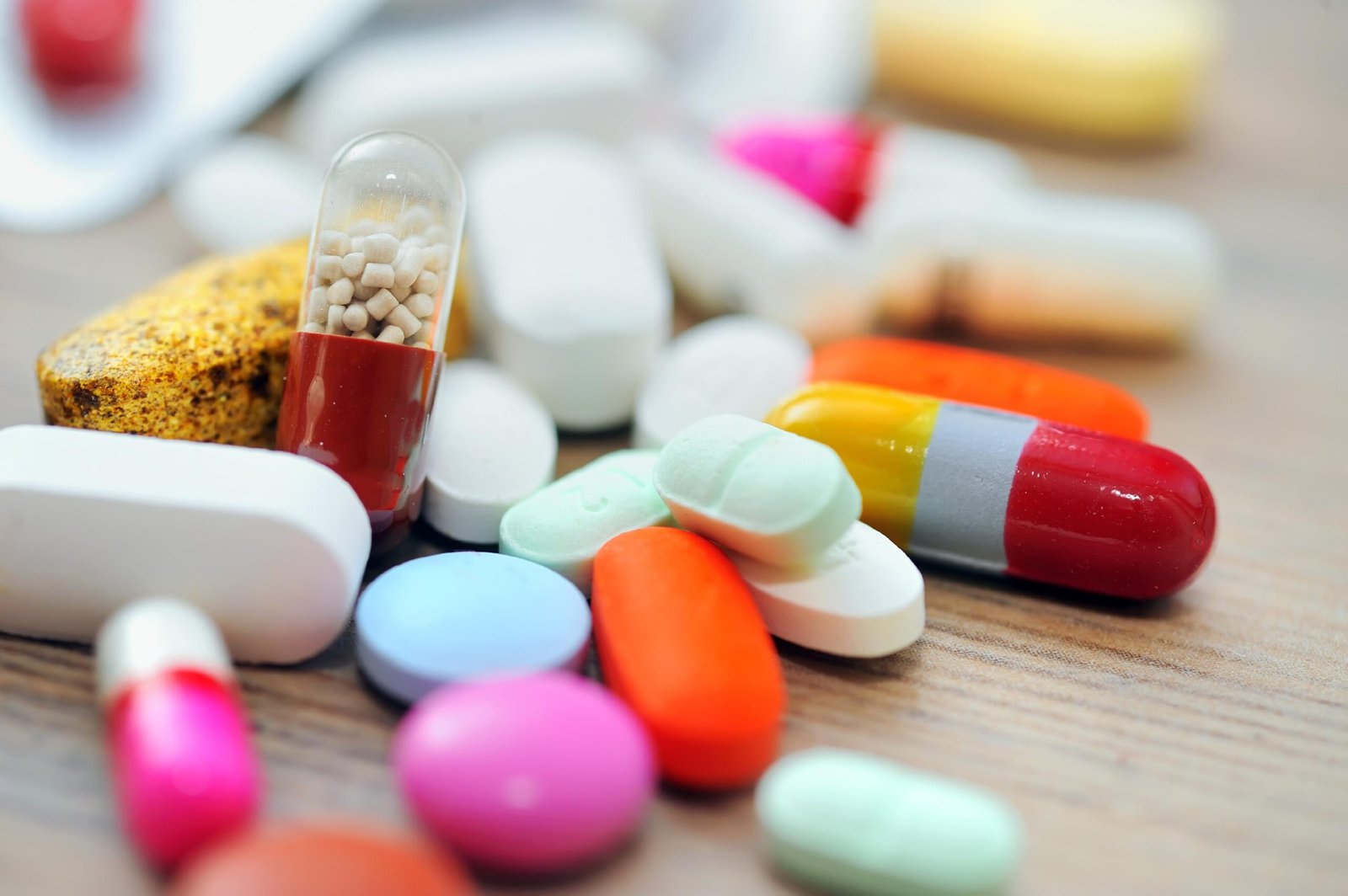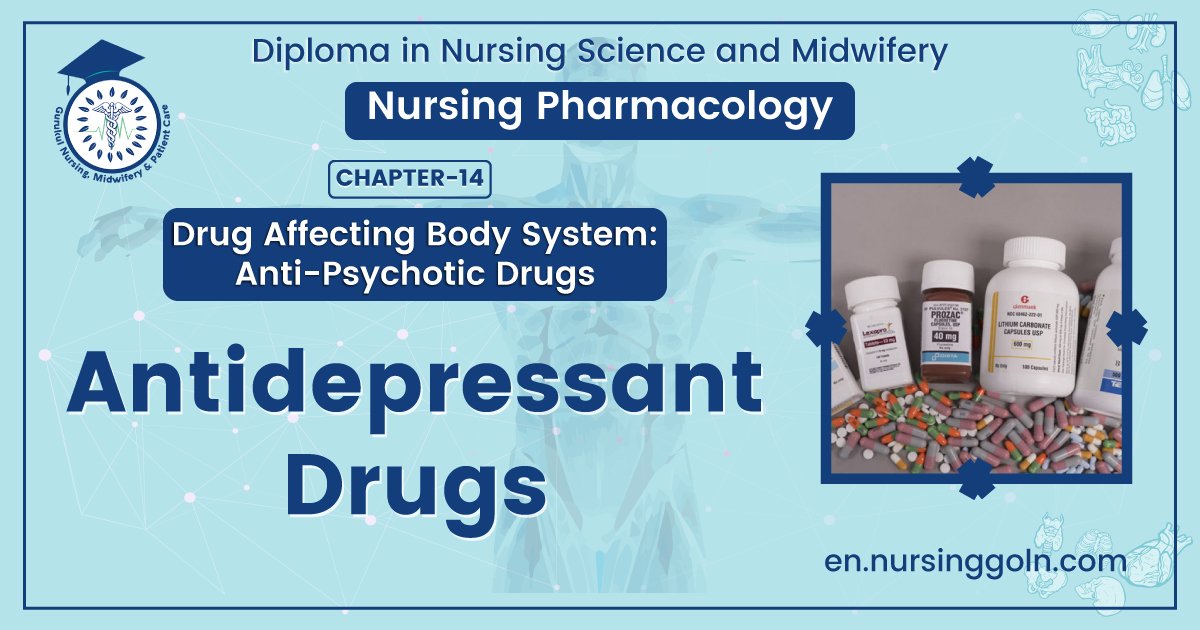Concept About Antidepressant Drugs – This book covers the entire syllabus of “Pharmacology” prescribed by BNMC- for diploma in nursing science & midwifery students. We tried to accommodate the latest information and topics. This book is an examination setup according to the teachers’ lectures and examination questions.
At the end of the book, previous questions are given. We hope in touch with the book students’ knowledge will be upgraded and flourish. The unique way of presentation may make your reading of the book a pleasurable experience.

Concept About Antidepressant Drugs
Depression: A mental or physical condition characterized by insomnia, anorexia, imitability, emotionalization, impaired concentration and suicidal tendency is termed depression.
Antidepressant; drugs that are used in the treatment5 of pathological depression are called antidepressant.
Symptoms of depression
1. A general felling of misery, apathy and hopelessness.
2. Preoccupation with guilt, inadequacy and ugliness.
3. Inanition
4. Loss of appetite
5. Slowing of movements
6. Indecisiveness.
Types of CNS Depressants
A. Selective: Depress the cough centre but stimulate CTZ in the medulla (example: morphine).
B. Non-selective: Depress the CNS as a whole (example: Chlorpromazine).
Classification of Antidepressant drugs
A. Tricyclic anti-depressanrs (TCA): (First generation antidepressants)
1. Imipramine
2. Desipramine
3. Clomipramine
4. Amitriptyline
5. Nortriptyline
6. Protriptyline
B. Atypical antidepressants: (Second generation antidepressants)
1. Amoxapine
2. Nomifensine
3. Mianserine
4. Maprotiline
C. Mono amino oxidase inhibitors (MAO-I):
1. Iproniazid
2. Phenelzine
3. Nialamide
4. Pargyline
D. Selective serotonin reuptake inhibitors (SSRI):
1. Fluoxetine
2. Paroxetine
3. Sertraline
E. Others: Lithium, L-tryptophane.
Degree of CNS depression:
1. First degree: Drug will just depress the CNS but does not produce any drowsiness or sleep, e.g. Tranquillization by Chlorpromazine.
2. second degree: Drug will cause drowsiness but not sleep, e.g. sedation by Barbiturates, Diazepam
3. Third degree: Drug will produce sleep, which is related to normal sleep, e.g. Hypnosis by intermediate and short acting Barbiturates.
4. Fourth degree: Drug will produce abnormal or deep sleep but not unconsciousness, e.g. narcosis by morphine/pethidine. These drugs will produce addiction.
5. Fifth degree: Drug will produce coma and death, e.g. overdose of general anesthetics (G.A.).
Adverse effects & toxicity of antidepressants
A. Anti-histaminic action:
➤ Sedation
➤ Lassitude
➤ Fatigue
B. Increase sympathetic activity:
1. Tachycardia
2. Sweating
3. Agitation
4. Psychosis
C. Anti-muscarinic action:
1. Dry mouth
2. Blurred vision
3. Constipation
4. Urinary retention
D. CVS (a-adrenergic blocking action):
1. Orthostatic hypotension
2. Arrhythmia
3. Delayed cardiac conduction
E. Neurogenic: Mania, convulsions.
F. Allergic: Cholestatic jaundice, agranulocytosis.
G. Blood: Haemolytie anaemia.
Indication of antidepressant drugs
A. As antidepressant:
1. Depression
2. Panic disorder
3. Obsessive compulsive disorders
B. Nocturnal enuresis.
C. Chronic pain.
D. Other indications:
1. Anorexia nervosa
2. School phobia (in children)
3. Attention deficit disorder.
(Note: all types of antidepressant take about two weeks are beneficial effects even though their pharmacological produced immediately).
Tricyclic Anti-Depressants: (Amitriptyline)
Amitriptyline is widely used anti-depressant, because it is most effective and less toxic than MAO- inhibitors.
Tricyclic anti-depressants (TCA) are so called because, their structure contain three benzene rings.
Mechanism of action of TCA
Tricyclic antidepressants
↓
Inhibit the reuptake pump of biogenic amines (norepinephrine, serotonin, dopamine)
↓
Increase concentration of amines in the brain.
↓
Longer duration of action of amines at the receptor site
↓
Antidepressant action
Pharmacological action of TCA
A. CNS:
➤ Normal subject:
- Sleepiness
- Light headache
➤ Anti-cholinergic effects (Dry mouth, blurred vision) Depressed patient:
- Elevation of mood
B. ANS:
➤ Antimuscarinic (atropine like) action
- Dry mouth
- Blurred vision
- Constipation
➤Urinary retention a1 -adrenergic antagonism:
➤ Postural hypotension
C. CVS
➤ Orthostatic hypotension (al – blockade action)
- Arrhythmia,
- Mild sinus tachycardia.
➤ECG: inversion/flattening of T waves CVS
Adverse effects of TCA
A. Anti-cholinergic effect:
- Dryness of mouth
- Blurred vision
- Constipation
- Urinary retention.
B. CNS effects:
- Confusion
- Parkinsonism
- Sedation
- Tremor
- Agitation
C. CVS effects:
- Tachycardia
- Hypertension
- Arrhythmia
D. Agranulocytosis
E. Cholestatic jaundice
Indication of Amitriptyline (TCA)
1. As antidepressant
2. Nocturnal enuresis (bed wet), in children over 6 years
3. Chronic pain.
4. Multiple sclerosis
5. Phobic anxiety syndrome (school phobia)
6. Hyperkinesis in children
7. Peptic ulcer.
8. Minimal brain damage
9. Alcoholism
10. Neurosis, Neuralgia, Migraine.

Contraindication of TCA
1. Ischemic heart disease
2. Cardiac arrhythmia
3. Pregnancy & lactation
4. Severe liver damage.
5. Following MAO-I within last two weeks
Doses of Tricyclic antidepressants (TCA)
A. Amitriptyline: 75-200 mg/day.
B. Imipramine: 75-200 mg/day.
C. Desipramine: 75-200 mg/day
D. Protriptyline: 20-40 mg/day
Interactions of TCA
| Interaction | Possible Cause |
| TCA + Guanetheidine Methyldopa: Hypertensive crisis | TCA prevent the uptake of Guanethidine at adrenergic nerve ending; so it prevents the antihypertensive action of Guanelhidine. |
| TCA + Aspirin: Action enhanced | Both drugs are strongly protein bound; so they compete each other. |
| TCA + Neuroleptics Steroids: TCA metabolism decreased | These drugs are metabolized by microsomal enzyme: SO they compete for their metabolizing enzyme with TCA. |
| TCA + Alcohol Potentiation of TCA effect. TCA + MAO-I = Potentiation of anti- depression. TCA + Antihypertensive drug = Potentiation of the antihypertensive effect (except clonidine & methyl dopa)= Chance of hypertension. |
Acute toxicity of TCA
Overdose of TCA causes toxicity. The main effects are on the CNS and heart. On CNS: Excitement, Delirium, Convulsions, Coma, Respiratory depression on heart: Cardiac arrhythmia Hypotension Death may occur from ventricular fibrillation.
Treatment of acute TCA toxicity
1. Activated charcoal.
2. Gastric lavage.
3. Physostigmine (anti-cholinesterase)
4. Anti-arrhythmic drugs.
5. Anti-convulsant: Diazepam.
